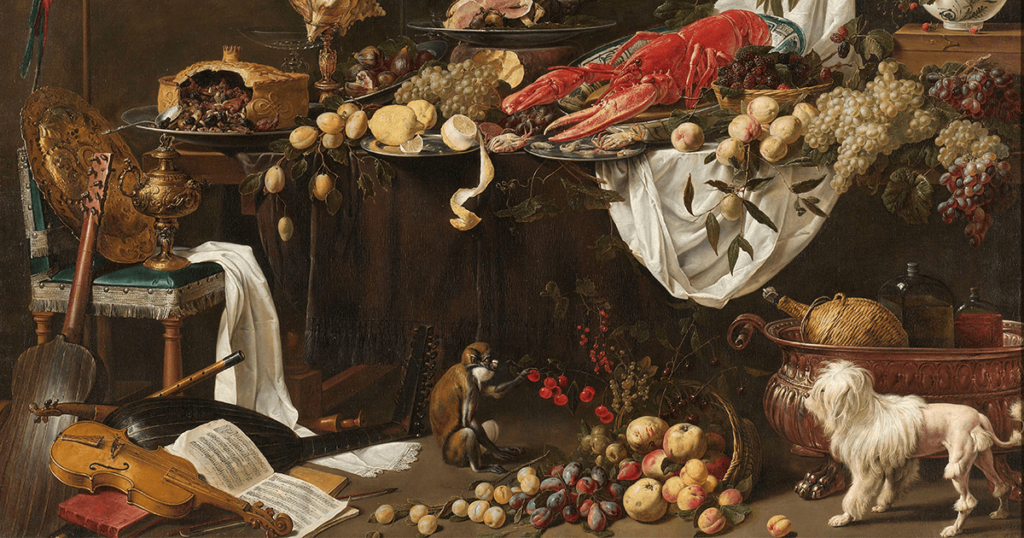
In the opening scene of Shakespeare’s Twelfth Night, Orsino, the Duke of Illyria, having been repeatedly rejected by the Countess Olivia, invokes a musical metaphor to describe his lovesick heart:
If music be the food of love, play on;
Give me excess of it, that, surfeiting,
The appetite may sicken, and so die.
Listening to an ensemble of musicians perform at his palace, the duke believes that by gorging on these nourishing sounds he might be relieved of his longings for Olivia. He then hears a harmonic cadence, the culmination of a line so sweet that it wafts over him like the scent of violets. At this point, the music seems to lose its charms, yet Orsino’s musings continue, as befitting the young romantic that he is—he might express the desire to be free of love’s torments, but his words suggest otherwise.
Orsino’s opening speech, one of the most famous passages in English literature, must have been a favorite of a 17th-century colonel named Henry Heveningham, for he used its first seven words as a way to begin one of his own poems:
If music be the food of love,
Sing on till I am fill’d with joy;
For then my list’ning soul you move
With pleasures that can never cloy,
Your eyes, your mien, your tongue declare
That you are music ev’rywhere.Pleasures invade both eye and ear,
So fierce the transports are, they wound,
And all my senses feasted are,
Tho’ yet the treat is only sound.
Sure I must perish by our charms,
Unless you save me in your arms.
It’s a very different kind of love poem than Orsino’s monologue, the object of the speaker’s affections being a singer who ravishes with her voice as much as with her looks. The poem is more direct, more carnal, but also less imaginative, without the finesse and the music of Shakespeare. These lines also lack the kind of startlingly inventive metaphor typical of the metaphysical love poetry of Marvell and Donne. And yet, the poem did inspire one of the loveliest, most beguiling of songs, composed by the English Baroque master Henry Purcell, who was born c. 1659 and who died on this date in 1695.
Few composers—in his time and in the centuries since—have been as deft as Purcell at marrying text and sound. His opera Dido and Aeneas is a seminal work, the most important of his compositions for the stage, and his songs, of which he wrote more than 100, are exemplary (such 20th-century English composers as Benjamin Britten and Michael Tippett would pay brilliant homage to them in their own ways). Between 1692 and 1695, Purcell composed three settings of Colonel Heveningham’s poem, all of them beautiful. The first two are more or less similar, but the third is a different work altogether, more florid, more darkly evocative.
It opens with a brief, enigmatic figure in the bass line, after which the soloist sings in the style of a recitative. As if to highlight the departure from Shakespeare (the exhortation in the text here is to Sing on, not play on), Purcell repeats that particular phrase, Sing on, each repetition becoming more and more embellished. The entire song is characterized by its melismatic style—that is, its use of melisma: the assigning of many notes, often in the form of an ornate run, to the singing of a single syllable. Purcell does this, for example, on the word food in the first line; on you in “That you are music ev’rywhere”; on wound in “So fierce the transports are, they wound”; and save in “Unless you save me in your arms.” The effect can be hypnotic. It’s as if Purcell is casting a spell with each melisma, holding the listener in a lovely trance. Such vocal ornamentations, as well as the clever use of repetition, provide not only color but also an unexpected emphasis on certain words and phrases.
Purcell evokes several distinct moods within the brief confines of this song. There’s the abiding melancholy of the first stanza, contrasted by the sly, seductive music inspired by the line “Your eyes, your mien, your tongue declare.” The second stanza is both an arioso and a lilting dance, and the final couplet changes tone once again, this time returning to the introspective style of the opening. With one last, utterly moving melisma, Purcell conveys a bleakness that we might otherwise not sense were we to simply read Colonel Heveningham’s poem: it is a work transformed, a love song that leaves the listener slightly uneasy, suffused as it is with both delight and desolation.
Listen to soprano Emma Kirkby, with Anthony Rooley on lute, Christopher Hogwood on harpsichord, Richard Campbell on viola da gamba, and Catherine Mackintosh on violin perform the third version of Purcell’s If music be the food of love: https://youtu.be/akq5Tv37R8s.

